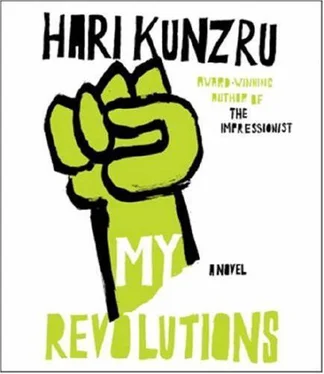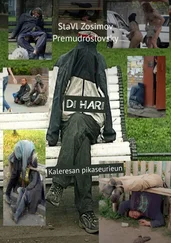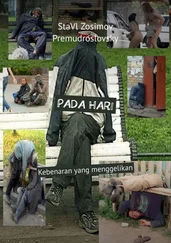With a sort of impersonal curiosity I noticed the horror I inspired in people. Perhaps, I began to think, I wasn’t inspiring their horror at all. Perhaps I was their horror. I forgot what had happened before. The world was an illusion. Death teemed in the cities and over the empty land. The more I struggled, the more death I produced. Suffering rippled out of me as I thrashed about in the water.
At last I got what I wanted. There is a period of two years, between 1974 and 1976, of which I remember nothing at all.
One day I returned to Bangkok. I knew I’d been there before because the route to the red light district was familiar. I arrived on foot. I’d been with a woman up in the north, but she’d died or left me. There was a weeping abscess on my arm and I was missing a tooth. For two or three nights I slept on the street in Patpong, curled up in an alleyway behind a go-go bar. “ Kee nok ,” the touts hissed at me, aiming punches and kicks to keep me away from their customers. Birdshit farang . The war in Vietnam was over, but the city was still full of Americans, uniformed soldiers and sailors, ex-GIs who couldn’t face going home. I told them hard-luck stories as they tumbled out of the bars with their girls. I’d make them laugh by imitating fractured Thai English. Pussy smoke cigarette,
pussy open bottle. There was a dealer who sat on a chair outside one of the prostitutes’ short-time hotels, an old man festooned with protective amulets. If you bought his gear he’d let you shoot it upstairs, in a low-lit room with a record player. That room was my Shangri-La, my El Dorado. I offered to sell him my passport.
I didn’t recognize the farang shaking my hand in front of Yom’s noodle stall. He kept saying his name, but I couldn’t understand him. “You see show?” I asked, trying to flip into my comic Thai-tout routine. “You want see love show?” He bought me food and watched me fix up in his hotel room. I think he must have paid for the heroin too. I nodded off for a while and woke up and looked at him looking tearfully back at me and it really was Saul Kleeman, prosperous and tanned, wearing a loud batik shirt, trying to talk to me about Anna.
“Chris,” he said, for the tenth or twentieth time.
“No, man,” I told him. “All that’s in the past.”
“Anna,” he said. “Anna’s dead.” He told me what had happened and let me sleep in his room and took me to the doctor and gave me fresh clothes and some time later, a day or two days, he took me downstairs and put me in a taxi. I stared blankly out of the window at paddy fields, my forehead pressed against the glass.
I never knew exactly what Saul was doing in Bangkok, or how to get in touch with him afterward. He saved my life, and I’ve always been grateful to him, even if I sometimes wish he’d minded his own business. He looked well, I remember. I’d like to think things went all right for him. I retained very little of what he told me about Anna. What I know now I’ve gleaned in fragments, over the years. Some of it I only found out from sifting through God’s unsorted stock of books.
Anna successfully fled Britain, with help from the PFLP. She disappeared from view for a time, living in the Middle East or North Africa, possibly in Libya, and next surfaced in 1974 as part of a team of terrorists who hijacked an airliner en route from Frankfurt to Tel Aviv, in an attempt to force the West German authorities to free prisoners of the RAF and Rote Zelle. They were
partially successful. The prisoners weren’t released but they were allowed to land in Algiers and fly out again on another plane, with a substantial sum of money. Gun Girl , the trashy biography illustrated with her ex-husband’s photos — the Chelsea fashion shots and a couple of salacious nudes — dates from this time, when she was an object of almost hysterical media interest in Britain.
Class warfare is life process , wrote Anna and her comrades, who came from Japan and Germany and the refugee camps of Lebanon. For us, production and destruction are identical. Three months after the Algiers hijack, eight of them entered the West German embassy in Copenhagen, an imposing neoclassical building on the waterfront. They killed a security guard and a junior diplomat and took twenty hostages in an upper room. Once the Danish police had surrounded the building, they issued a series of demands, including the release of prisoners in Israeli and West German jails and the provision of an aircraft to fly them to the destination of their choice. After the first twelve-hour deadline expired, they took the economic attaché on to the balcony and shot him in the head. It is possible that Anna herself was the executioner. There is a photograph said to be of her, taken earlier that day, leaning out of a second-floor window, raising a fist.
The siege lasted almost eighty hours. Bonn and Tel Aviv refused to negotiate. On the third night, Danish special forces moved in and retook the building. During the assault, all the terrorists, seven hostages and three soldiers were killed. Anna’s body, or the body that was identified as hers, was found in the conference room, badly burned: a booby-trap rigged by the terrorists had been detonated during the assault. The oddest aspect of the siege was the terrorists’ reported use of a technique that in earlier communiqués they termed the ARC effect. Surviving hostages testified that they’d been herded into the conference room, where projectors and audio equipment were set up. For more than twenty-four hours they were subjected to some kind of audiovisual display, incorporating taped speeches and images of American atrocities in Vietnam. The purpose, it seems, was experimental — to induce ARC, an
acceleration of revolutionary consciousness, to alter their politics with son et lumière .
The Anna of the embassy siege is someone I never knew, who’d traveled to a psychological place I could never follow. My Anna was a woman who consciously suppressed her own desires in the name of a greater good. Always, in some part of myself, I’d refused to connect the two, so it felt like a revelation, a coup, when I realized in France that it was possible she hadn’t been in Copenhagen after all. When we were lovers, I would always pester her about the future. I wanted to know what she imagined, what sort of society she hoped to create. I think, covertly, I wanted her to describe how things would be for us, for me and her. I never understood why she always rebuffed my questions, until the day she angrily insisted I stop asking them. “Can’t you see,” she told me, “that the future’s not for us?” I didn’t follow. “Look at how we live,” she said. “We’re damaged people. There would be no place for us in the world we’re trying to build.”
When I arrived at Wat Tham Nok I was in a state of agitated withdrawal. For the last hour of the journey, I’d been hassling the driver to let me out, but he only waved a hand and tapped his fingers against his pursed lips, indicating that he spoke no English. When I saw the golden spire of the stupa I realized my destination was a temple but nothing prepared me for what was to come, the prison conditions of the addicts’ compound, the formation exercises in front of a huge portrait of the king. The abbot of Wat Tham Nok had been curing alcoholics and drug addicts for years using his own patented herbal emetic, a vile potion containing more than a hundred ingredients. Saul had paid for me to take the cure, giving instructions that I couldn’t be trusted to look after myself and should be restrained if I tried to leave. This was how I came to spend my first twenty-four hours at Wat Tham Nok chained to a pillar.
I was barely aware of where I was. I thought Saul was present in the room, and screamed at him that he was a bastard pig traitor. I thought he’d sold me into slavery. They’d dressed me in a set of
Читать дальше












